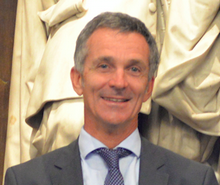A SHORT BIOGRAPHY

You can download my short bio (bio-French, bio-English), my CV (CV-French, CV-English, CV-English-long)
Nicholas Ayache is a Research Director at Inria (French Research Institute for Computer Science and Applied Mathematics), Sophia-Antipolis, France, where he leads the EPIONE project-team dedicated to e-Patients for e-Medicine.
He is also the Scientific Director of the new AI institute 3IA Côte d'Azur of which he holds a research chair, a member of the French Academy of Sciences and a member of the French Academy of Surgery. His current research focuses on AI methods to improve diagnosis, prognosis and therapy from medical images and clinical, biological, behavioral and environmental data available on the patient.
Between Jan. 2012 and Dec. 2015, N. Ayache was the first Chief Scientific Officer of the newly created Institut Hospitalo-Universitaire (IHU) of Strasbourg.
N. Ayache has also been a scientific consultant for several industrial companies or international research institutes, and has been a co-founder of five start-up companies in image processing, computer vision, and biomedical imaging.
After his engineering degree (Ecole des Mines, 1980) and his Master of Science (UCLA, 1981), N. Ayache received his Ph.D in 1983, and his "Thèse d'Etat" in 1988, both in computer science, from the University of Paris XI, on the development of vision capabilities for autonomous robots.
Since 1988, N. Ayache's research interests have been focused towards the creation of computational tools for the analysis of medical images, for image-guided therapy and surgery simulation. A central point of his research is the introduction of advanced geometrical, statistical, biophysical and functional models of the human body for the analysis and simulation of medical images.
N. Ayache is the author or editor of 12 books, the author of 30 book chapters, 12 patents, and more than 400 peer-reviewed scientific publications which have received over 43,000 citations (h-index 100), according to Google Scholar (May 2018).
N. Ayache is the co-founder and co-Editor in Chief of the scientific journal Medical Image Analysis (Elsevier), an Associate Editor of Transactions on Medical Imaging (IEEE), a member of the editorial board of Computer Assisted Surgery (Wiley), and Medical Imaging Technology (Japanese Society of Medical Imaging), a member of the editorial board of Siam Journal on Imaging Science.
In 1995, N. Ayache chaired the first International Conference on Computer Vision, Virtual Reality, and Robotics in Medicine (CVRMed) held in Nice, and in 2003 he co-chaired the First Symposium on Surgery Simulation and Soft Tissue Modeling. In 2007 he was Program Chair of the MICCAI (Medical Image Computing and Computer Assisted Intervention) conference in Brisbane, and was elected General Chair of the MICCAI 2012 Conference held in Nice in October 2012.
Nicholas Ayache received in December 2006, the "EADS Grand Prize of Information Sciences and Applications" from a jury of French Academy of Sciences, in October 2007, the "Researcher of the Year award" from the "Nouvel Economiste" Journal and in October 2008 the "Microsoft Award for Science in Europe" awarded jointly by the Royal Society and the French Academy of Sciences. In October 2011, he was awarded a prestigious ERC (European Research Council) advanced grant for the analysis of dynamic medical images (MedYMA 2012-2017), and received in Nagoya (Japan) the 2013 Enduring Impact Award for the sum of his publications.
During the year 2007, Nicholas Ayache was an invited research scientist at MIT, Harvard and Brigham & Women's Hospital (Boston, USA).
Nicholas Ayache was elected a professor at the Collège de France, on the Chair Informatics and Digital Sciences for the academic year 2013-2014. The program of his courses and invited seminars can be found here.
In 2014 he received the "Grand Prize Inria - Académie des sciences" and was elected a member of the Académie des sciences.
In 2017, he was elected at the French Academy of Surgery as a free member, for his contributions to the "Personalized Digital Patient".